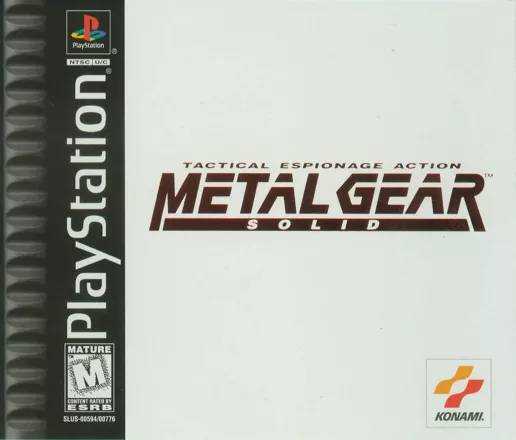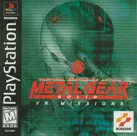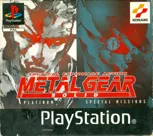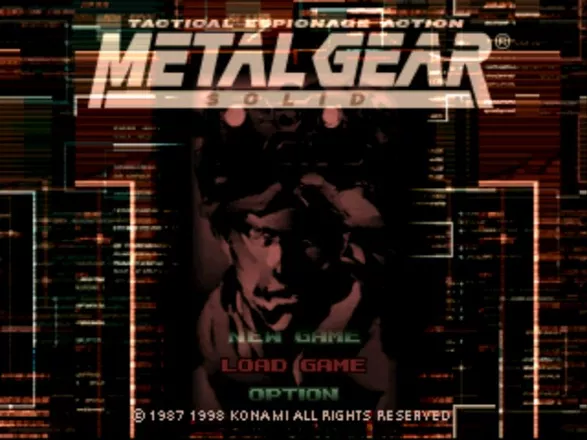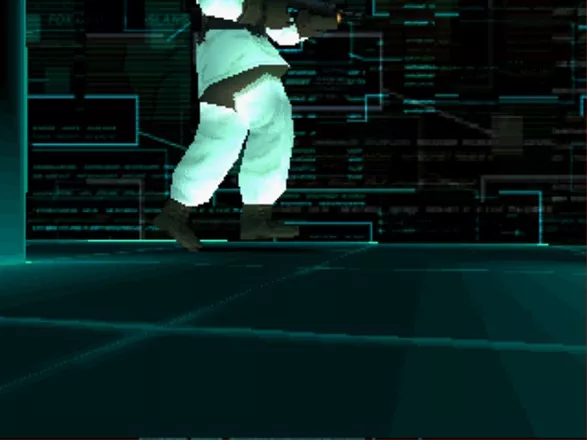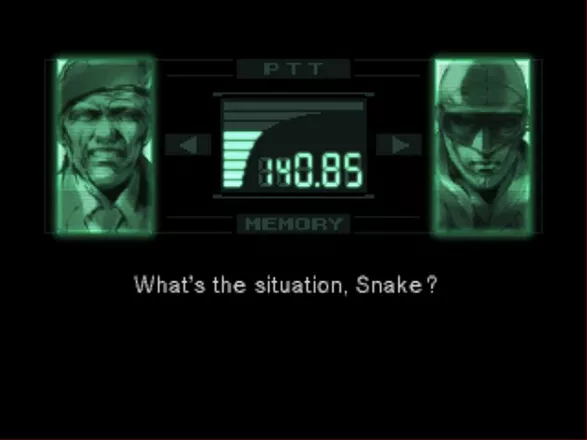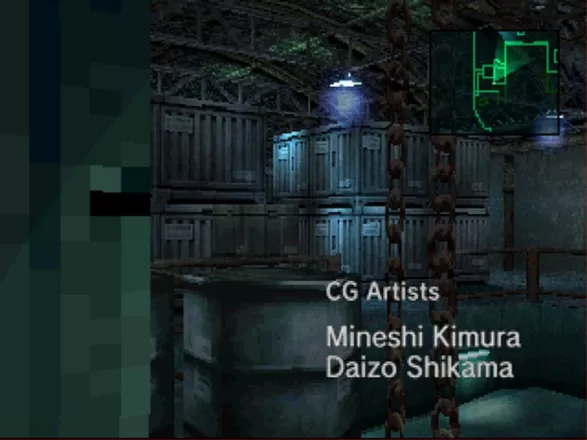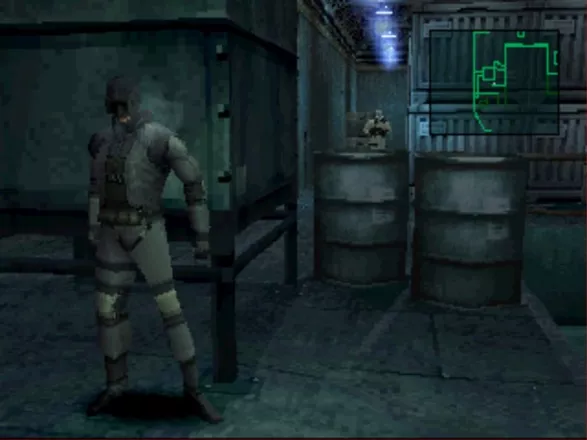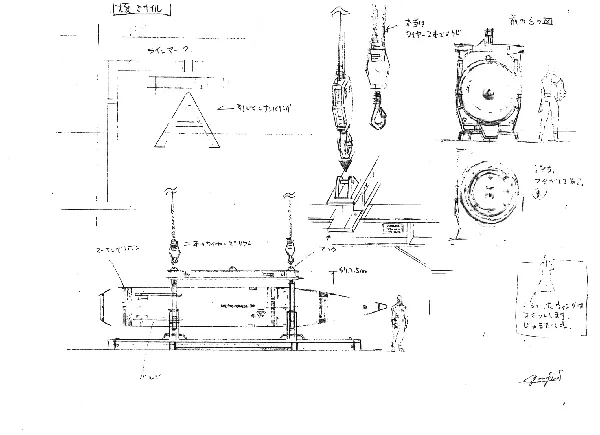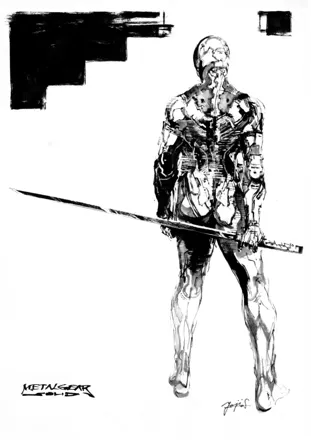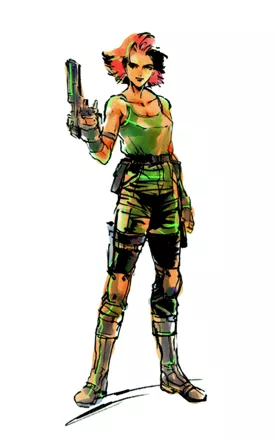Metal Gear Solid
-
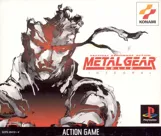 Metal Gear Solid
(1999 on
PlayStation, 2000 on
Windows, 2013 on
PSP...)
Metal Gear Solid
(1999 on
PlayStation, 2000 on
Windows, 2013 on
PSP...)
-
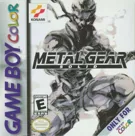 Metal Gear Solid
(2000 on
Game Boy Color)
Metal Gear Solid
(2000 on
Game Boy Color)
Description official descriptions
Metal Gear Solid is a sequel to Metal Gear 2: Solid Snake. After the tragic confrontation with Big Boss, the hero, special agent Solid Snake, decided to retire and has since then lived in a secluded region in Alaska. But the US government recruits him once again for a dangerous mission. The members of Foxhound, a renegade special forces unit, threaten to use a devastating nuclear weapon if the government doesn't hand them the mortal remains of Big Boss, their former commander. Foxhound is now led by a talented, ambitious young man with the codename Liquid Snake. Knowing that the visual resemblance between this new terrorist mastermind and himself can not be coincidental, Solid Snake agrees to infiltrate the new Foxhound base, destroy the unknown nuclear weapon, and find the truth about his own identity.
The gameplay in Metal Gear Solid follows the prototype established in the two earlier Metal Gear games. Solid Snake has a limited arsenal of weapons and cannot allow himself to pave his way to the goal by killing all the enemies. He has to stay unnoticed, hide, crawl, wait for the right moment, sneak, and use various gadgets that will prevent him from alerting the enemy. Boss battles and some other sequences are played out as action-oriented set pieces, with the player having to figure out the weakness of the enemy in order to succeed.
The game utilizes a traditional top-down view, but the graphics in this installment are real 3D. Conversations with Snake's allies and cutscenes are used extensively to advance the plot and gain more insight into it.
Spellings
- メタルギアソリッド - Japanese spelling
- 合金装备 - Chinese spelling (simplified)
- 特攻神諜 - Chinese spelling (traditional)
Groups +
- Boss Fight Books games
- Console Generation Exclusives: PlayStation
- Game feature: Original theme song
- Gameplay feature: Drowning
- Games made into books
- Games made into comics
- Games that include a playable demo of another game
- Metal Gear series
- PlayStation Greatest Hits releases
- PlayStation Platinum Range releases
- Protagonist: Mullet haircut
- Setting: Future now past
- Theme: Psychic powers / Psionics
- Video games turned into board / card games
Screenshots
Promos
Credits (PlayStation version)
191 People (166 developers, 25 thanks) · View all
| Solid Snake | |
| Liquid Snake |
|
| Meryl Silverburgh |
|
| Naomi Hunter |
|
| Hal Emmerich |
|
| Roy Campbell |
|
| Mei Ling |
|
| Gray Fox (Ninja) |
|
| Nastasha Romanenko |
|
| Revolver Ocelot |
|
| Vulcan Raven |
|
| Psycho Mantis | |
| Sniper Wolf |
|
| Donald Anderson |
|
| Kenneth Baker |
|
| Jim Houseman |
|
| Genome Soldier A | |
| Genome Soldier B | |
| Johnny Sasaki | |
| Enemy Soldier | |
| Computer Voice |
|
| European package design |
|
| [ full credits ] | |
Reviews
Critics
Average score: 95% (based on 37 ratings)
Players
Average score: 4.1 out of 5 (based on 254 ratings with 11 reviews)
A legend that put the Metal Gear series on the throne!
The Good
- Great graphics for the time
-
Memorable music
-
Atmosphere is perfectly crafted
-
Highly satisfying ending that makes one think about life
The Bad
-Sometimes the cut scenes would be a tad bit too long
-Storyline is a bit complex, but not so much as to detract from the game
-Controls are fairly easy, but sometimes you'd get stuck on a wall more often than you wanted
The Bottom Line
First of all, I finally got around to playing this game in 2012, and even with the dated graphics, even with all the other newer games I've played, I was wowed by it. I forgot I was playing PS. Pretty amazing for a 14 year-old game. This title is also leaps and bounds better than any other game on the PS that I've tried; it was basically the 'killer app' for the PS.
As special forces agent Solid Snake, you infiltrate an Alaskan nuclear storage facility taken over by terrorists, who are demanding the remains of Big Boss for some inexplicable reason. You must stop them from possibly detonating a nuclear device and save two important hostages in the process. As you adventure through the dark, frigid base, the plot thickens, with strange happenings and questionable allies. A weapon called Metal Gear is at the heart of it all (basically a giant robot mech that can launch nukes from anywhere in the world). The story does get pretty complex, and has to do with gene therapy, genetically targeted viruses, etc. Ultimately, there are enemies all around Snake with hidden agendas that even outweigh Metal Gear. Snake must do what he can to survive.
Don't miss this classic! You're doing yourself a disservice for not trying it.
PlayStation · by lado (25) · 2012
A game, a hero and the save the world plot get a hellava lot better.
The Good
The yawn save the world story. Its old. Giant tomatoes, computer and biological viruses, a 100-story tall lizard, and the Russians and/or Nazi's. But this it's a new thang. Save the world from... terrorists ? In Alaska ? With real live (or almost there) techologies and weapons? You mean it could happen? Yup. You'll find it all in MGS.
Your character Solid Snake, is a well developed, ass-kickin' , sneaky sonofabitch, who's been retired and was rehired by the US government to kick terroist ass.
All and all the gameplay is excellent. The weapons ( SOCOM , the Famas, C4, Claymores and the PSG-1, just to name a few) Are easy to handle and are totally apporpiarte for many boss fights. The story , complete with in-game FMV is solid and riviting, qualites you find in books, not games.
The Bad
You're unable to hold an item in one hand and wear another item , it's either one or the other.
Inablity to kill the dogs.
Hal Emmerich is a wussy.
The Bottom Line
A playable novel.
PlayStation · by Jason Lee (10) · 2001
The Good
This game is one of my all time favourites. The first time I played it was when I rented it. I actually finished it a week later and bought it anyway. My friend was so impressed with it: he went and bought a PS, just so he could get Metal Gear Solid.
The thing that really won me over with this game wasn't the graphics, game play or sound. It was the story, the voice acting and the characters. The overall game is really well done, but I was drawn in by those particular elements. The director, actors and writers did a really great job.
The way that the characters speak to each other sounds very believable. The story was just really easy to get into. Very entertaining. MGS has such a flow to it, that it's very difficult to take a break from it. You just want to see what happens next.
After I completed it, I got to thinking: The newer generation of video games can be as good as any classic movie or book. It has become more like an art-form.
MGS is a good example of this: With memorable characters and an interesting story.
The Bad
I liked everything about it.
The Bottom Line
Awesome!
PlayStation · by Robert C (6) · 2003
Discussion
| Subject | By | Date |
|---|---|---|
| Zovni's (really old) review for this is great! | Simoneer (29) | Oct 5, 2010 |
Trivia
Action figures
For the US release of Metal Gear Solid, McFarlane Toys was entrusted with the sculpting of an action figure line based on the game by Konami. Consisting of one series, the lineup includes: Solid Snake, Meryl Silverburgh, Ninja, Revolver Ocelot, Psycho Mantis, Sniper Wolf, Vulcan Raven, Liquid Snake and a limited edition Psycho Mantis repaint. This series has been re-released several times (later in double-packs).
Copy protection
The box for the PlayStation version of the game features a frequency for the CODEC communicator that is required to progress through the game, as shown in one of the screenshots.
Emulation
One of three games to be emulated on the short-lived bleemcast! PlayStation emulator for Dreamcast.
References
Members of the development team hid images of themselves throughout the game. These images or 'ghosts' as they are referred to are only visible by taking photographs of certain areas in the game with the camera item.
References to the game
This game is referenced in the Eiffel 65 song, My Console.
Rumors
There were untrue rumors about Greg Eagles, the actor who voiced Grey Fox, being dead. In fact, he was mistaken for Kaneto Shiozawa, the actor who voiced the same character in the Japanese version of the game, who died in 2000.
Voice acting
Due to union regulations, the voice cast (with the exceptions of David Hayter and Doug Stone) used pseudonyms during the recording sessions, and were credited that way. Here's a list with the voice actors names and their respective pseudonyms: Cam Clarke (James Flinders), Debi Mae West (Mae Zadler), Jennifer Hale (Carren Learning), Christopher Randolph (Christopher Fritz), Paul Eiding (Paul Otis), Kim Mai Guest (Kim Nguyen), Greg Eagles (Greg Byrd), Renée Raudman (Renee Collette), Patric Zimmerman (Patric Laine), Peter Lurie (Chuck Farley), Tasia Valenza (Julie Monroe), Allan Lurie (Bert Stewart) and William Bassett (Frederick Bloggs).
Awards
- Electronic Gaming Monthly
- December 1998 (Issue #113) - Game of the Month
- 1999 Buyer's Guide - Best Artwork
- 1999 Buyer's Guide - Best Butt Shot
- 1999 Buyer's Guide - Best Voice Work
- 1999 Buyer's Guide - Most Hype for a Game
- 1999 Buyer's Guide - Best Ending
- 1999 Buyer's Guide - Best Special Effects
- 1999 Buyer's Guide - Best Use of a Vibrator
- 1999 Buyer's Guide - Ranked 1 (Top 10 PlayStation Games)
- April 1999 (Issue 117) - PlayStation Game of the Year
- April 1999 (Issue 117) - PlayStation Game of the Year (Readers' Choice)
- April 1999 (Issue 117) - Adventure Game of the Year
- April 1999 (Issue 117) - Adventure Game of the Year (Readers' Choice)
- April 1999 (Issue 117) - Best Music runner-up (Readers' Choice)
- April 1999 (Issue 117) - Best Sound Effects
- April 1999 (Issue 117) - Best Sound Effects (Readers' Choice)
- April 1999 (Issue 117) - Best Graphics
- April 1999 (Issue 117) - Best Graphics runner-up (Readers' Choice)
- April 1999 (Issue 117) - Game of the Year runner-up
- April 1999 (Issue 117) - Game of the Year runner-up (Readers' Choice)
- February 2006 (Issue #200) - #12 out of 200 of the "Greatest Games of Their Time" list
- Game Informer
- August 2001 (Issue #100) - #17 in the "Top 100 Games of All Time" poll
- October 2004 (Issue #200) - #12 on the "Greatest Games of Their Time" list
- GameSpy
- 2001 – #32 Top Game of All Time
- Retro Gamer
- September 2004 (Issue #8) – #70 Best Game Of All Time (Readers' Vote)
Information also contributed by Ace of Sevens, Big John WV, chirinea, Evil-Jim, Grant McLellan, Indra was here, J. Michael Botorff, PCGamer77 and Zovni.
Analytics
Related Sites +
-
Hints for Metal Gear Solid
The solutions are revealed one tip at a time to give you just the help you need. If you're stuck, these hints will help you. -
JUNKER HQ
This fansite is dedicated to the games produced and/or designed by Hideo Kojima and contains all kinds of trivia, artwork, plot summaries, discussion forums and more. -
Metal Gear Solid PC
Official Site -
Metal Gear Solid: The Unofficial Site
A fansite that contains information about the whole Metal Gear franchise, including galleries, interviews, downloadable content and discussion boards. -
Wikipedia: Metal Gear Solid
Information about Metal Gear Solid at Wikipedia
Identifiers +
Contribute
Are you familiar with this game? Help document and preserve this entry in video game history! If your contribution is approved, you will earn points and be credited as a contributor.
Contributors to this Entry
Game added by Kartanym.
PS Vita added by GTramp. PlayStation 3, PSP added by Foxhack. PlayStation added by Grant McLellan.
Additional contributors: woods01, Unicorn Lynx, Jeanne, tlm, tarmo888, Alaka, DreinIX, —-, Paulus18950, Caelestis, Patrick Bregger, Plok, yenruoj_tsegnol_eht (!!ihsoy).
Game added October 19, 2000. Last modified February 23, 2025.


